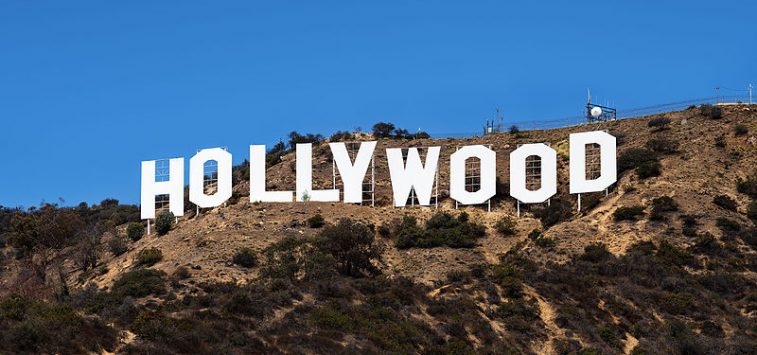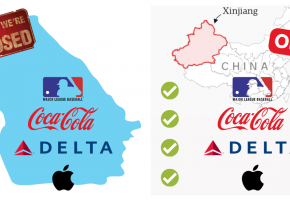
Propaganda Outlet Triggered By Report Revealing How Hollywood Appeases China
The Communist Party of China’s leverage over Hollywood is the subject of a 94-page report by PEN America, a free expression advocacy group. The expose has triggered Chinese state media.
In response to the meticulously researched document, The Global Times, a hawkish communist mouthpiece, issued a fierce rebuttal declaring the United States to be “psychologically fragile.” The CCP outlet’s column laughably claims that, “compared to the US, China is the beacon of openness, diversity and reason.”
The advocacy group’s essay earned attention in Western media. Below, a sampling of several headlines that likely sparked the CCP’s ire.
“PEN America calls for Hollywood transparency on China censorship to ‘protect artistic freedom’” – Los Angeles Times
“Hollywood Is “Increasingly Normalizing” Self-Censorship for China, Report Finds” – The Hollywood Reporter
“Eyeing big China box office, Hollywood bows to censorship” – AFP
PEN begins by making the economics of the situation clear: “China is imminently poised to become the world’s biggest movie market.” They write that “by 2023, the Chinese box office revenue was predicted, in one pre-pandemic estimate, to reach $15.5 billion.” This fact has led Tinseltown powerbrokers to train an “explicit eye” towards what will or won’t be permitted in Beijing.
The Investigative Research Center found that, according to 2019 Chinese box office receipts, the top 5 Disney movies alone hauled in more than $1 billion. ‘Avengers: Endgame’ earned $614,316,021, ‘Captain Marvel’ generated $154,070,663, ‘Frozen II’ took in $122,319,598, ‘The Lion King’ $120,446,631 and ‘Aladdin’ $53,481,575. This helps provide further context to Disney-boss Bob Iger’s refusal to comment on the crackdown against Hong Kong protesters: “To take a position that could harm our company in some form would be a big mistake.”
PEN predicts that the “pressures on Hollywood studios to accede to CCP censorship will only increase.”
Their report examines the lengths Xi Jinping has gone to strengthen Communist propaganda: “In 2018, China’s leaders implemented a massive regulatory shake-up, one geared at further centralizing power into the hands of President Xi and the ruling Chinese Communist Party. The SAPPRFT was eliminated, and regulatory oversight over all media was given to the Central Propaganda Department (CPD). The CPD is not technically a government body, but instead the public relations/propaganda division of the ruling Chinese Communist Party. Its head, Huang Kunming, is considered a close ally of President Xi Jinping, and reports to him directly.”
The end goal of the Xi regime is to force Hollywood to present a “sanitized and positive image of China and its ruling party, and encouraging Hollywood films to promote messages that align with its political interests”
The report is worth reading in its entirety, and can be done so by clicking here.
The subject of Hollywood’s insidious bowing to Beijing censors has recently received heightened attention. In July, Secretary of State Mike Pompeo issued a broadside against the entertainment industry: “In Hollywood, not too far from here – the epicenter of American creative freedom, and self-appointed arbiters of social justice – self-censors even the most mildly unfavorable reference to China.” In an address to the Motion Picture Association of America (MPAA) he urged filmmakers to reject censorship and tell the truth about China.
Last fall, Comedy Central’s legendarily irreverent cartoon South Park created a brouhaha by blasting Hollywood’s fealty to CCP censorship in an episode titled “Band in China.” The show provided a wicked ridicule, with one of the characters lamenting “we live in a time when the only movies that us American kids go see are the ones that are approved by China.”
The Xi regime didn’t see humor in the truth, and they responded by deleting the show. According to The Hollywood Reporter, CCP censors deleted “virtually every clip, episode and online discussion of the show from Chinese streaming services, social media and even fan pages A cursory perusal through China’s highly regulated internet landscape shows the animated series conspicuously absent everywhere it recently had a presence. A search of the Twitter-like social media service Weibo turns up not a single mention of South Park among the billions of past posts. On streaming service Youku, owned by internet giant Alibaba, all links to clips, episodes and even full seasons of the show are now dead.”
This flash-point illustrates the danger Hollywood has put itself in by continuously appeasing the Xi regime. Tell the truth about China, and face getting deep-sixed in an instant.
That may be good for freedom, but it’d be bad for their bottom lines.



